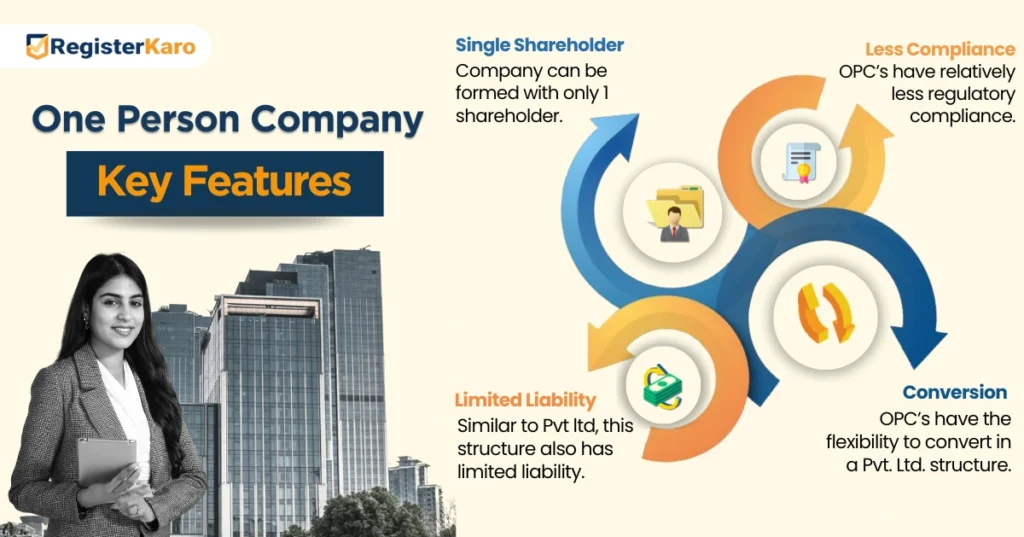
What is the Difference Between OPC and Private Limited Company?
One Person Company and Private Limited Company are two popular forms of business entities operating under the Companies Act, 2013. Each structure has its own unique features and benefits. This makes it crucial for aspiring entrepreneurs to understand their differences before choosing the most suitable option for their business.
This article aims to provide a comprehensive comparison between the two structures, highlighting their distinct characteristics, legal requirements, ownership structures, and other essential factors.
Understanding One Person Company (OPC)
The Companies Act of 2013 introduced the concept of One Person Company (OPC), bringing a significant change in the corporate landscape. It enables an individual to establish and operate a company with limited liability. This provides the benefits of a corporate entity while retaining full control over its business operations.
This structure is particularly helpful for solo entrepreneurs who want to maintain complete control over their business while enjoying the benefits of a limited liability company.
Key Features of OPC
- Single Shareholder: OPC allows for the formation of a company with just one individual as its shareholder, offering sole ownership and control over the business.
- Nominee Director: If the sole shareholder dies or becomes incapacitated, the company will appoint a nominee director to manage its affairs.
- Less Compliance: OPCs are subject to relatively fewer compliance requirements compared to Private Limited Companies, making them an attractive option for solo entrepreneurs looking for simplicity and ease of operation.
- Limited Liability: Similar to a Pvt Ltd Company, OPC provides limited liability protection to its sole shareholder. This safeguards personal assets against business debts and liabilities.
- Conversion: OPCs have the flexibility to convert into Private Limited Companies as they grow and expand their business operations, offering scalability and access to additional resources.

Understanding a Private Limited Company
Entrepreneurs favor a Private Limited structure because it is highly flexible, credible, and scalable. This structure enables multiple shareholders and provides the advantages of limited liability protection while also offering a platform for growth and expansion.
Key Features of a Private Limited Company
- Multiple Shareholders: Unlike OPC, a Private Limited structure requires a minimum of two shareholders and can have up to a maximum of 200 shareholders, facilitating diversified ownership and investment.
- Separate Legal Entity: It is considered a separate legal entity distinct from its shareholders, enabling it to enter into contracts, acquire assets, and incur liabilities in its own name.
- Board of Directors: This structure is required to have a board of directors comprising at least two individuals, ensuring governance and decision-making are distributed among key stakeholders.
- Limited Liability: Shareholders of a Private Limited structure enjoy limited liability protection, ensuring personal assets are shielded from business debts and legal liabilities.
- Compliance Requirements: This structure is subject to more stringent compliance requirements compared to OPCs, including holding regular board meetings, maintaining statutory registers, and filing annual returns with regulatory authorities.

Similarities between OPC and Private Limited Company
While being two separate structures, a One Person Company and a Private Limited Company may still have a lot of similarities. A few of these are listed below:
- Governing law: The Companies Act of 2013 governs both OPCs and private companies.
- Registration Process: Both One Person Companies and Private Limited entities must register with the Ministry of Corporate Affairs.
- Limited liability: OPC and Private Limited Companies provide limited liability protection to their owners/shareholders.
- Legality: OPC and Private Limited Companies are separate legal entities, and the personal assets of their owners/ shareholders are not liable for the company’s losses.
- Taxability: Both entities are subject to the same tax rates as per the provisions of the Income Tax Act.
- Audit: Both OPCs and private companies must appoint auditors within 30 days of incorporation for statutory audits, regardless of their share capital or turnover.
What are the Differences between OPC and Private Limited Company?
The following are the main differences between OPC and Private Limited Company in India:
1. Name of Entity
As the name suggests, in the case of a One Person Company, the company name has to have a suffix (OPC), and in the case of a Pvt. Ltd. Company, the name of the company has to end with the suffix Private Limited. Companies are typically incorporated as OPC Pvt. Ltd. or OPC Private Limited.
2. Minimum Capital Required
There is no requirement for a minimum paid-up capital. However, when the paid-up capital exceeds Rs. 50 lakhs, One Person Company must mandatorily convert to a private limited company ( Pvt. Ltd.), while in the case of a Private Limited Company, the Companies Amendment Act, 2015, relaxed the minimum requirement for paid-up capital.
You no longer need to invest a minimum amount of capital to start a private limited company.
3. Minimum Members
A One Person Company can have a minimum of one member and a maximum of one member. On the other hand, in a Private Limited Company, the minimum number of members required is 2 up to a maximum of 200.
4. Minimum Number of Directors
In a One Person Company, the minimum number of directors to start a company is 1. While in a Private limited Company, the minimum number of directors to start a company is 2. Both entities can have a maximum of 15.
5. Conversion
A One Person Company can convert to a Private Limited Company after 2 years of its incorporation or when its turnover exceeds the threshold limit.
6. Annual Filings
In a One Person Company, the minimum number of directors to start a company is 1, while in a Private Limited Company, the minimum number of directors to start a company is 2. Both entities can have a maximum of 15.
7. Transferability of Shares
In a One Person Company, shares can be transferred only by altering the Memorandum of Association. While in a Private Limited Company, shares can be transferred easily.
8. Board Meeting
Each One Person Company must hold one board meeting in each half of the calendar year, with a gap of at least 90 days between meetings. In case of one director, no need to hold a board meeting. On the other hand, a Private Limited Company must hold one board meeting each quarter of the calendar year, with a maximum gap of 120 days between meetings.
Ending Note
The confusion between OPC and Private Limited Company makes people go for an incorrect choice, which results in losses. There are lots of practical benefits given to private companies by way of new changes made in the Companies Act. One Person Companies have many similarities, but what makes a Private Limited Company different is the hassle-free incorporation and transferability.
Both entities have the same taxation procedure because there are no separate provisions for One Person Companies. A Private Limited Company has an edge over an OPC in many aspects.
Thus, people should opt for a Private Limited Company because, at a certain point in time, they will have to convert their one-person company into a Private Limited Company.
Frequently Asked Questions
A Private Limited Company is a small company that is privately owned by a group of people. The liability of the members of a Private Limited Company is limited to the number of shares respectively held by them. Shares of a Private Limited Company cannot be publicly traded.




